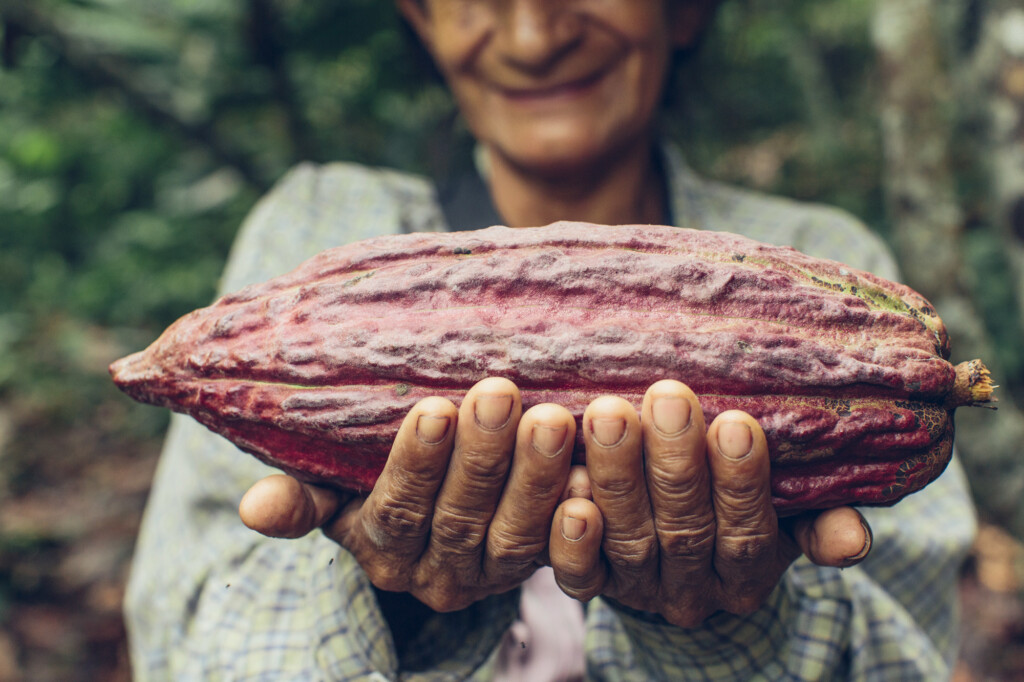Big Chocolate on Brink of Revolution as Swiss Scientists Use Cocoa Bean Waste to Replace Sugar

Researchers in Zurich have found a way to potentially transform chocolate manufacturing by using the husk and the flesh of the cocoa bean pod to create a sugary syrup.
Clearing two hurdles in one jump, it would allow chocolatiers to remove sugar from the process, and reduce the immense amount of biological waste required to produce chocolate.
Reporting for the BBC from Geneva, Imogen Foulkes describes chocolate production as picking up an apple, pulling out the seeds, and throwing the rest in the garbage.
Cocoa beans, the key ingredient in chocolate, are just that—the beans of the plant. The large, papaya-sized pod and the heaps of white milky flesh inside, are tossed away to rot in the sun, producing thousands of tons of methane, a potent, short-lived greenhouse gas.
At Zurich’s prestigious Federal Institute of Technology, scientist Kim Mishra and his team distilled the juice contained inside the flesh into a concentrated syrup. Then, by mixing in the pulp as a thickener, and even the husk, they produced a chocolatey gel that’s ideal for making chocolate outright, or as a sweetener, and which contains 14% simple sugars by weight.
Mishra and his team explain that cocoa farming faces several endemic problems, including the poverty that the farmers often live in, and the constantly rising price of the beans.
“Instead of fighting over who gets how much of the cake, you make the cake bigger and make everybody benefit,” Mishra told the BBC.
“The farmers get significantly extra income through utilizing cocoa pulp, but also the important industrial processing is happening in the country of origin. Creating jobs, creating value that can be distributed in the country of origin.”
As is often the case with sustainable renovations on old industries, the cocoa gel is more expensive than sugar—9-times for expensive by Mishra’s reckoning.
But he points out that most governments that manage large domestic sugarcane industries generously subsidize the production of the devil’s white dust.
ALSO CHECK OUT: Coffee Grounds Show Potential to Clean Up Common Water Contamination from Agriculture
If the subsidies were removed, the cocoa gel would be much more competitive. Mishra told the BBC that chocolate industry entities from three continents have already contacted him with interest in his invention, and is certain he will receive some interest from the Swiss chocolatiers.
Agricultural subsidies are about the most undemocratic economic policy imaginable, but most voters and citizens remain ignorant of their effects, so they unfortunately remain ubiquitous across the West. In both principle and reality, subsidies siphon off a portion of the salaries and wages in society and present them as a gift to farmers to ensure that they can sell goods that are not desired at a price that allows them to make a living.
A BETTER KIND OF AGRICULTURE: Bird-Friendly Maple Syrup Boosts Vermont Forest Diversity and Resilience
As a result, tens of billions are doled out to farmers who won’t produce a gram of food you’d actually see in the supermarket, but merely to mass produce inedible crops like wheat, corn, soy, oilseed rape, and sugar which have fueled the rise in ultra-processed foods that have allowed America to lead the world in chronic disease.
SHARE This Mega Innovation With Chocoholics In Your Life…
>read more at © GoodNews
Views: 1